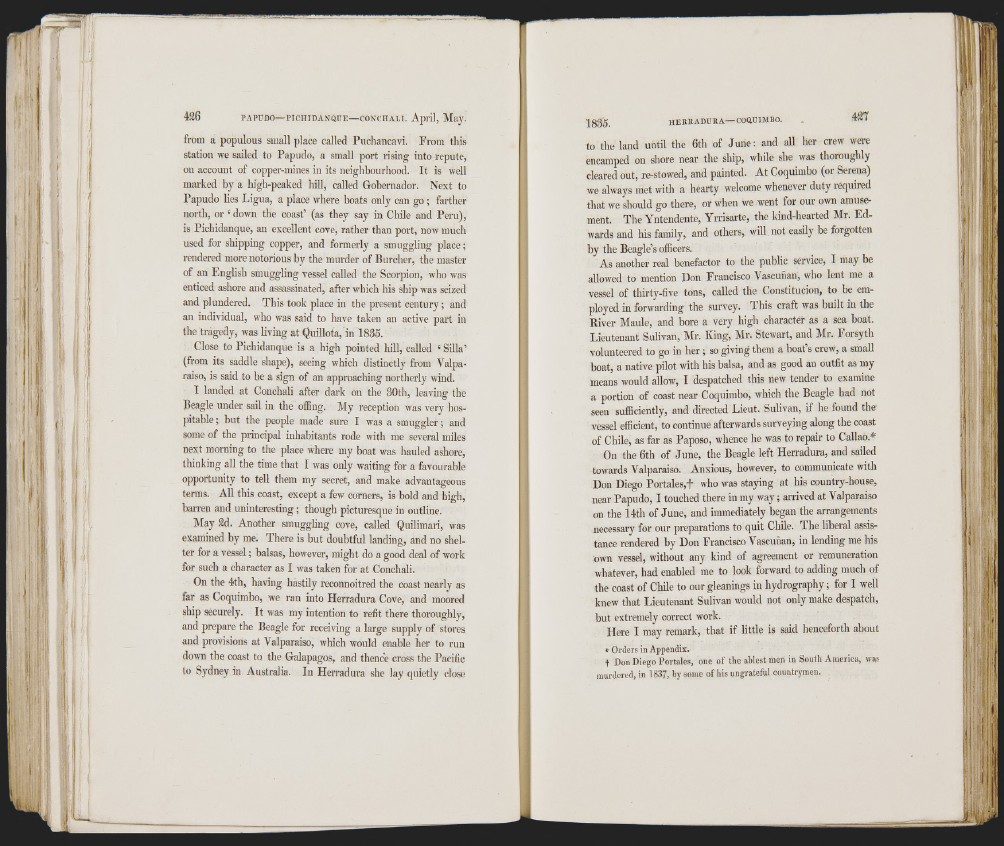
!¡
ii
r
I
.',6
426 PAPUDO— PICHIDANQUE CONCHALI. Api'il, Alaj.
from a populous small place called Pucliancavi. From this
station we sailed to Papudo, a small port rising into repute,
on account of copper-mines in its neighbourhood. I t is well
marked by a high-peaked hill, called Gobernador. Next to
Papudo lies Figua, a place where boats only can g o ; farther
north, or ‘ down the coast’ (as they say in Chile and Peru),
is Pichidanque, an excellent cove, rather than port, now much
used for shipping copper, and formerly a smuggling place;
rendered more notorious hy the murder of Burcher, the master
of an Fnglish smuggling vessel called the Scorpion, who was
enticed ashore and assassinated, after which his ship was seized
and plundered. This took place in the present century; and
an individual, who was said to have taken an active part in
the tragedy, was living at Quillota, in 1835.
Close to Pichidanque is a high pointed hill, called ‘ Silla’
(from its saddle shape), seeing which distinctly from Valparaiso,
is said to be a sign of an approaching northerly wind.
I landed at Conchali after dark on the SOth, leaving the
Beagle under sail in the offing. My reception was very hospitable
; but the people made sure I was a smuggler; and
some of the principal inhabitants rode with me several miles
next morning to the place where my boat was hauled ashore,
thinking all the time that I was only waiting for a favourable
opportunity to tell them my secret, and make advantageous
terms. All this coast, except a few corners, is bold and high,
barren and uninteresting ; though picturesque in outline.
May 2d. Another smuggling cove, called Quilimari, was
examined by me. There is but doubtful landing, and no shelter
for a vessel; balsas, however, might do a good deal of work
for such a character as I was taken for at Conchali.
On the 4th, having hastily reconnoitred the coast nearly as
far as Coquimbo, we ran into Herradura Cove, and moored
ship securely. It w'as my intention to refit there thoroughly,
and prepare the Beagle for receiving a large supply of stores
and provisions at Valparaiso, which would enable her to run
down the coast to the Galapagos, and thence cross the Pacific
to Sydney in Australia. In Herradura she lay quietly close
1835. h e RIIADU R A— COQUIMBO. 427
to the land until the 6th of June: and all her crew were
encamped on shore near the ship, while she was thoroughly
cleared out, re-stowed, and painted. At Coquimbo (or Serena)
we always met with a hearty welcome whenever duty required
that we should go there, or when we went for our own amusement.
The Yntendente, Yrrisarte, the kind-hearted Mr. Fd-
wards and his family, and others, will not easily be forgotten
by the Beagle’s officers.
As another real benefactor to the public service, I may be
allowed to mention Don Francisco Vascuñan, who lent me a
vessel of thirty-five tons, called the Constitución, to be employed
in forwarding the survey. This craft was built in the
Biver Maule, and bore a very high character as a sea boat.
Lieutenant Sulivan, Mr. King, Mr. Stewart, and Mr. Forsyth
volunteered to go in her ; so giving them a boat’s crew, a small
boat, a native pilot with his balsa, and as good an outfit as my
means would allow, I despatched this new tender to examine
a portion of coast near Coquimbo, which tbe Beagle had not
seen sufficiently, and directed Lieut, Sulivan, if he found the
vessel efficient, to continue afterwards surveying along the coast
of Chile, as far as Paposo, whence he was to repair to Callao.#
On the 6th of June, the Beagle left Herradura, and sailed
towards Valparaiso. Anxious, however, to communicate with
Don Diego Portales,# who was staying at his country-house,
near Papudo, I touched there in my way; arrived at Valparaiso
on the 14th of June, and immediately began the arrangements
necessary for our preparations to quit Chile. The liberal assistance
rendered by Don Francisco Vascuñan, in lending me his
own vessel, without any kind of agreement or remuneration
whatever, had enabled me to look forward to adding much of
the coast of Chile to our gleanings in hydrography; for I well
knew that Lieutenant Sulivan would not only make despatch,
but extremely correct work.
Here I may remark, that if little is said henceforth about
* Orders in Appendix.
t Don Diego Portales, one of the ablest men in South America, was
murdered, in 1837, by some of his ungrateful countrymen.
ll
ih